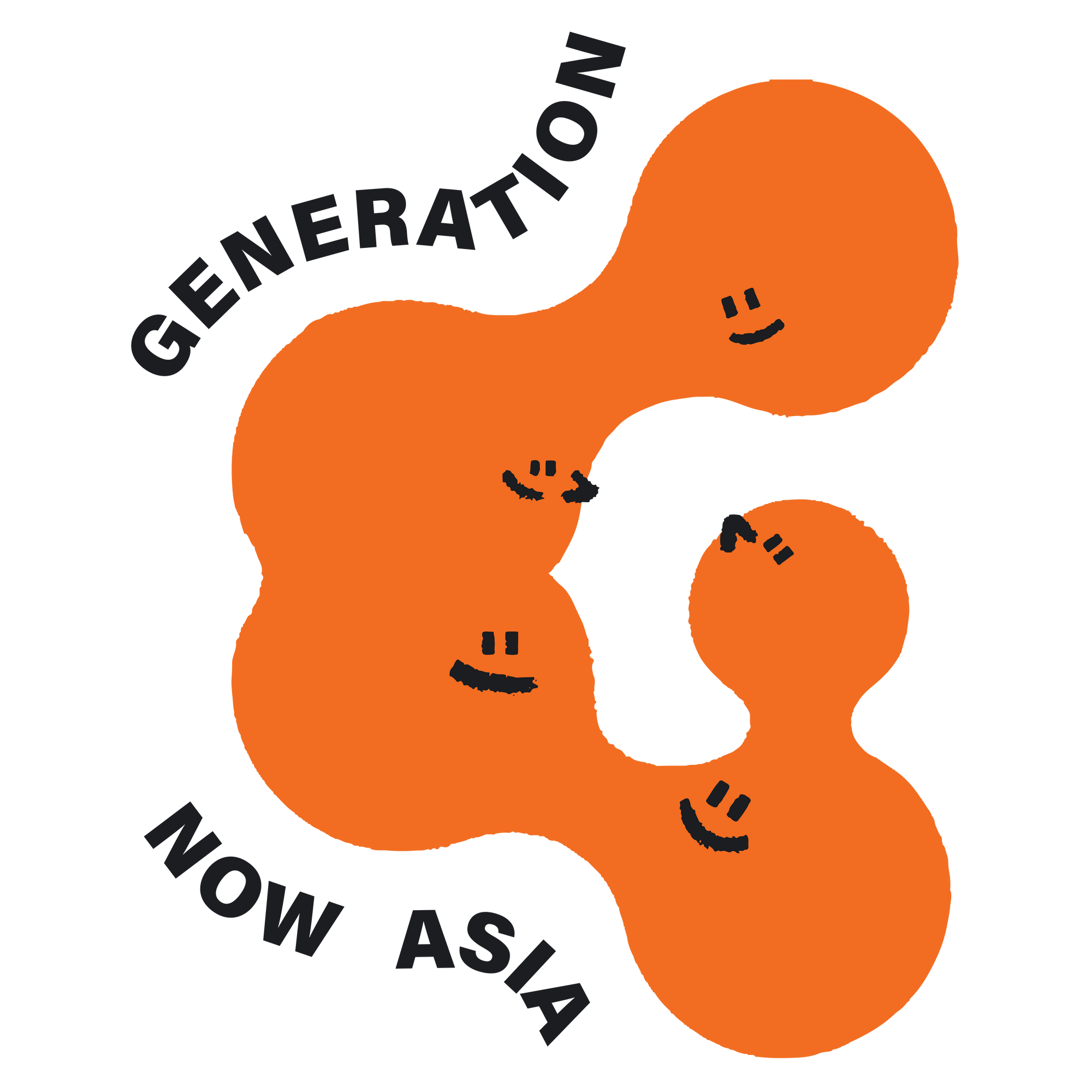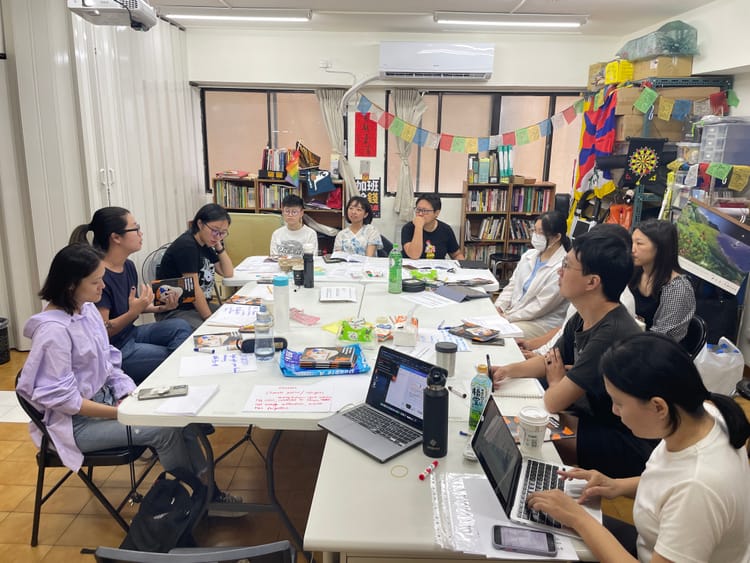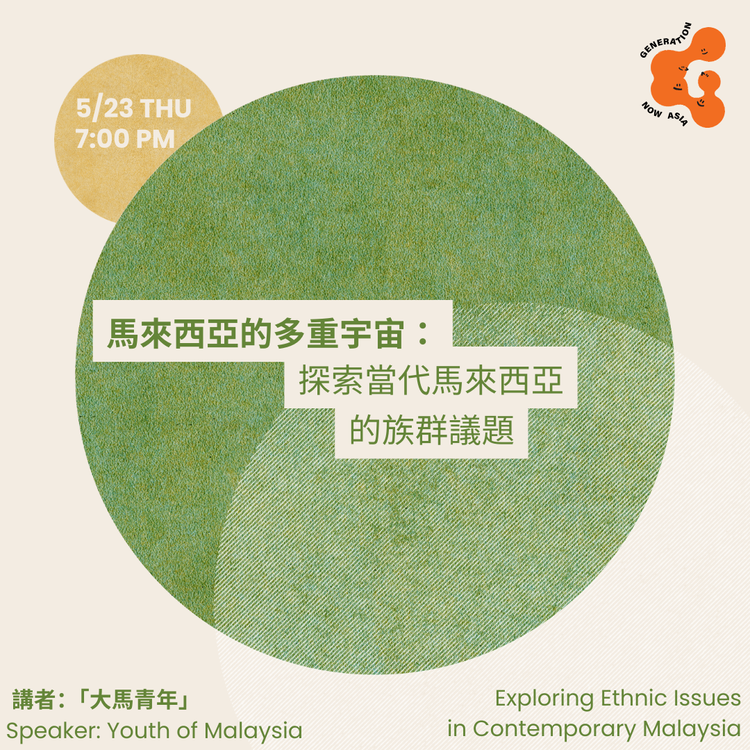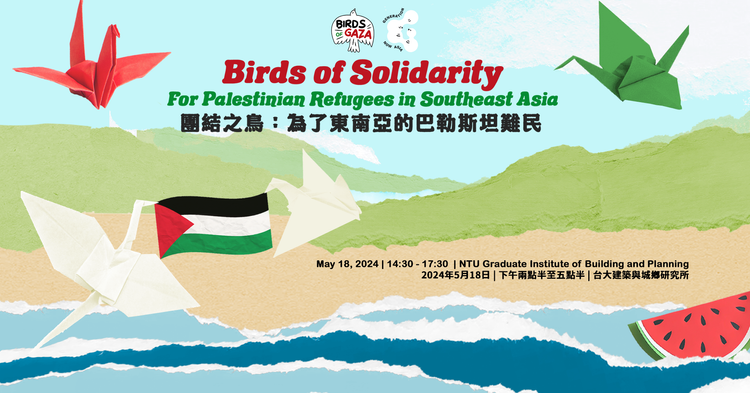講座筆記【家庭看護與現代奴隸的距離】Notes from Advocating for Southeast Asian Domestic Workers' Rights in Taiwan
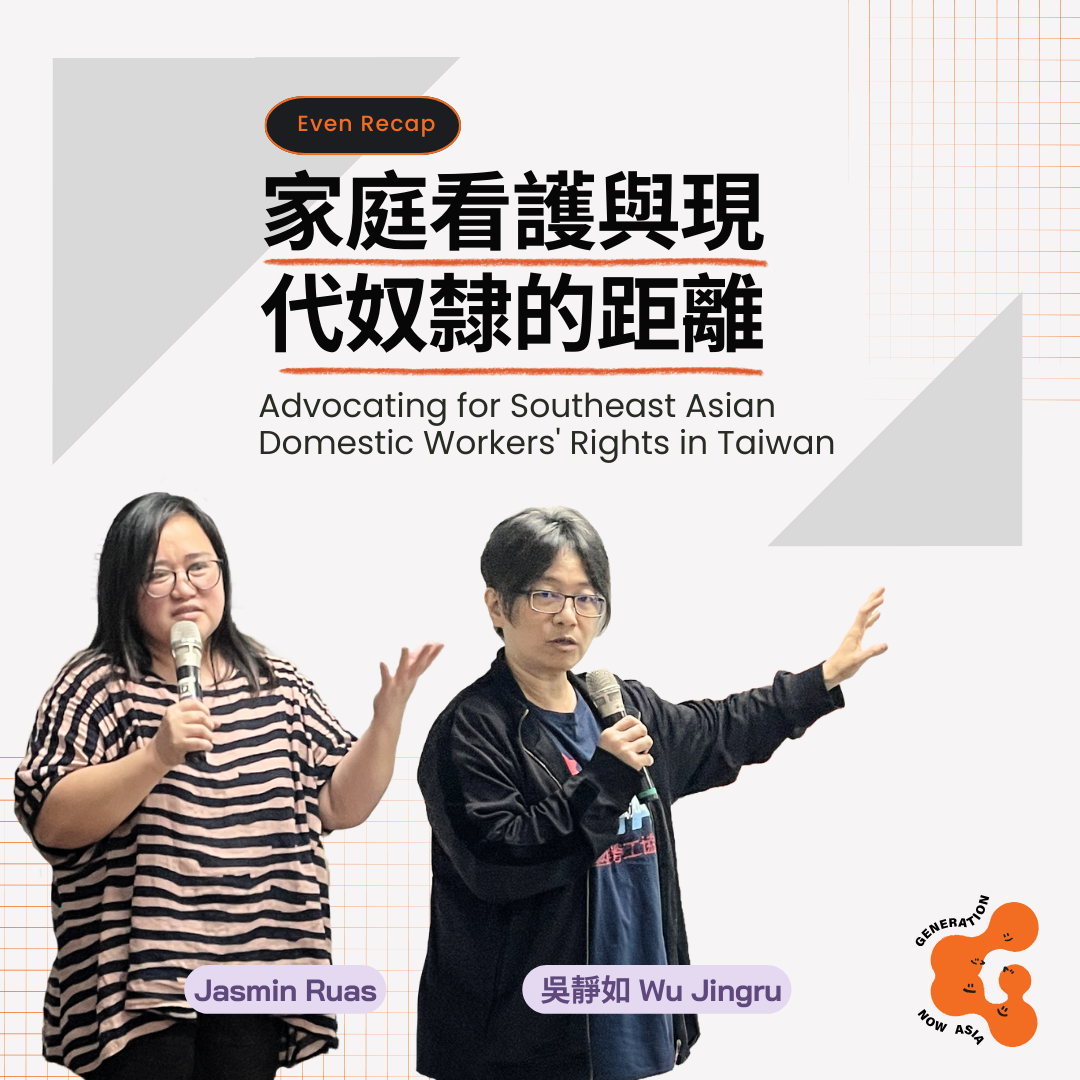
文/亞洲鬧世代志工 Claire Huang 黃梅舒
3月27日,台灣國際勞工協會(TIWA)研究員吳靜如,及桃園市家庭看護工職業工會(DCU)新任理事Jasmin Ruas應亞洲鬧世代之邀,分享在台家庭看護移工所面臨的挑戰,以及家庭看護工與現代奴隸的距離。
社福移工需求節節攀升,彰顯台灣社會照服需求
講座一開始,Jasmine首先帶著觀眾思考勞工的身分,以及付出勞力所換取的東西。她表示,勞工雖然並無擁有產線,但他們是財富的創造者。勞工付出勞力並不只換取薪資,他們也希望自己能過上有尊嚴與體面的生活。
吳靜如接著爬梳在台移工的歷史脈絡與輪廓,自1992年台灣政府引進移工以來[1],在台移工人數持續增加。根據最新資料,目前在台移工約為77萬名,主要來自印尼,其次為越南。外籍工作者又可依產業概分為二類:一類是經常被喚作「移工」或「外勞」的藍領移工。第二類則是常被喚作「老外」的白領移工。
在台移工可分為「產業移工」與「社福移工」。前者又可簡稱廠工,產業範疇包含漁業、農業、營造業、製造業,曾有段時間人數未增加。反觀社福移工的人數在過去30多年來節節攀升,人數唯一下降的時候是在COVID-19、實施邊境管制期間。由此可看出,台灣社會對社福移工的需求持續增加。
Jasmine Ruas表示,家護移工可能是一位母親、有自己的家庭,千里迢迢來到台灣,為台灣無數個家庭提供照護服務。家護移工滿足了台灣家庭的照護需求,但在台工作卻不被照護。
家護移工的挑戰——高工時、無薪假、欠缺連續休息
吳靜如點出,製造業、營造業、漁業常見的問題為「雇主欠薪」;個別家護勞工最常碰到的問題則為「高工時、無薪假」。對家護勞工來說,長時間工作又放無薪假是最辛苦的事。
吳靜如表示,與照顧孩子不同,照顧老人或病人相當於「一命換一命」。「照顧工作是以被照顧者24小時的需求為中心」,這使得照護人員無法事先規劃未來,也無法連續地休息。
Jasmine分享自己的照護經驗,很可能吃飯吃到一半,阿公阿嬤呼喚要大便,自己就需要立即去清理排泄物。當清理完畢之後,還得要照樣吃的下飯。這並不是每個人都有辦法做到的。「照顧工作的辛苦不在於熬夜,而在於沒辦法長期或連續休息」,吳靜如補充。
而且這樣的累,是長期的累。不論是家護勞工或照顧家中長輩的子女,照護工作都對身心靈造成很大的負擔。政府卻在保障家護勞工權益上失靈。吳靜如直言,「在台灣,就是政府教大家如何歧視這些藍領移工。」
家護工不受勞基法保障,民團倡:家事勞動應入法
首先,藍領移工與白領移工在政策上享有的權益有很大的差別。譬如,藍領移工不是順利找到工作就好,雇主也需要接受考評是否符合標準。藍領移工從最初的求職就有了限制。「權利差異造就了藍白領移工在台灣政府眼中不同的模樣。」
不只藍白領工待遇有別,藍領移工之間也有差別。吳靜如表示,台灣《勞動基準法》(以下簡稱勞基法)的立法始於境外力量:因美國為不讓台灣廉價廠工奪走美國工人的工作,因此在1980年代促成台灣制訂勞基法[2]。
吳靜如指出,家務勞動與工廠勞動之間,有很大的差別。其中一項差別,就是家護工不受勞基法保障。也因此,2008年台灣移工聯盟與勞動部一條條討論勞基法[3],希望能將家護工納入勞基法,但因最終討論未果。因此民團多年來倡議制定《家事服務法》,要求有關單位能針對家事勞動服務的特殊性額外立法,以保障家務工的權益。
自2000年初期至今,家護工仍是無法保障。由於家護移工被迫勞動與剝削等問題,2016年催生出桃園市家庭看護工職業工會(DCU),成為台灣史上第二個移工工會。Jasmine分享,DCU由家護移工組成,除了捍衛家護移工之外,也是一個支持系統,例如協助需要心理醫療的成員求助,或教導成員如何在媒體或大眾面前發言,進行遊說與倡議。
薪資、管束,與仲介制定義家務勞工的「廉價」
吳靜如點出,在台的家務勞工極其「廉價」。從家務勞工薪資歷次調整走勢來看,1992年的家務移工薪資位於15,840元(新台幣)。32年後的今日(2024),家務勞工的薪資漲幅卻僅5,000元不到。與基本工資10,000多元的薪資漲幅相比,家務勞工薪資成長極為緩慢。
吳靜如指出,社會學裡,「家庭看護工的勞動」被視作「家務勞動」;在政治經濟學裡,「家庭看護工的勞動」被視作「再生產勞動」[4]。從這兩個領域出發,所有的家務勞動皆不被政府監督與管理,一切都被家庭化。然而在女性主義的脈絡裡頭,若要解放女性勞動力,家務社會化是一項很重要的條件。
家務工廉價的不只在薪資,同時還包含了「管束」——是否能自由轉換工作。吳靜如表示,「是否能夠自由轉換工作是一項非常卑微的權利」。他解釋,當勞工被迫賣勞動力,一般的勞工至少還能夠用離職、轉職等方式,來表達不願繼續工作。然而,在台的藍領移工(包含家務移工)卻被剝奪這項權利,而「疫情期間,這樣的管束更是嚴重」。
此外,仲介制也是問題。2019年,在台灣移工聯盟MENT與移工的努力之下,共同出版了《移工的仲介故事書》(Migrant Workers’ Storybook of Employment Agents),收錄了15位移工離鄉背井來台打工,卻遭到仲介欺騙、剝削、惡待的血淚故事。這本書譯有中、英、印、越、菲、泰等六種語言,並於2023年開放版權,希望能讓更多人了解,為何移工團體主張「廢除私人仲介制度」,並要求政府負起聘雇移工的責任。
政府退位與結構下的「弱弱相殘」
2018年8、9月,分別發生兩起有關家護移工的新聞。一則是外籍家護工陪伴被照顧者前往醫院就醫時,因走路有異樣,被醫師察覺並檢查發現家護工的臀部已壞死。另一則則是有關外籍移工虐待被照顧者。這兩則新聞事件反應出台灣的照護現狀——「弱弱相殘」。當所有的照護責任都堆在個別家戶中,雇主、勞工與被看護者就成了制度底下的犧牲者。
「到底什麼樣的原因造成了三輸的局面?」吳靜如直言,就是因為「政府退位了!」
去年年底因應總統大選,國民黨總統候選人侯友宜提出放寬家庭看護移工的聘僱門檻,引起移工、社福與人權團體的反對。為此,去年9月TIWA、婦女新知基金會、台灣人權促進會等數個社運團體聯合召開記者會,提出:
- 家庭照護不應是一對一的照顧責任,而是多對一的照顧關係。
- 取消在宅照顧的制度(live-in),並改由機構照顧,透過輪派、走動的方式,讓照顧者與被照顧者能夠獲得比較好的照顧條件與勞動條件。
最後,吳靜如再次強調,照護病人與老人是一件讓人身心俱疲的事情。要解決台灣當前照護所遇到的問題,並不是換了看護工的護照就有用。
註釋
[1] 1989年,台灣政府為因應六年國建(1991-1997)重大公共工程所需,且由於《就業服務法》仍在研議階段,通過了「十四項重要工程人力需求因應措施方案」,有條件地引入3,000名外籍移工。由於台灣對外國勞動力的依賴程度日漸提升,政府隨後在1992年公布實施的《就業服務法》中,設立「外國人之聘僱與管理」專章,開放外籍移工引進台灣。
[2] 1970-1980年代台灣對外出口擴張,對美國享有貿易順差。當時,美國因對外貿易赤字急速惡化,美國國內眾多工會認為,開發中國家對勞工提供較低的薪資、較差的勞動條件,使得產品生產成本低於美國廠商,致使在價格競爭中取得優勢。美國國會於1974年訂定「1974年貿易法第301條」(Section 301 of the Trade Act of 1974),授權美國總統實施保護措施,以避免國內產業受國外競爭壓力影響。在這樣的背景之下,美國國會以301條款,要求台灣提升勞動條件,並促成台灣《勞動基準法》的制定,於1984年由立法院三讀通過與實施。
[3] 《家事服務法》:2003年劉俠事件震驚台灣社會,也突顯家護移工勞動權益受到漠視,以及在種族、階級、性別的多重壓迫下,家護勞工「無法適用、無法保障」的艱難處境,導致病人與外籍家護工成為結構問題下的犧牲者。為保障家護移工的勞動權益,2004年台灣國際勞工協會(TIWA)串聯關注移工議題的草根組織,共同組成PAHSA(Promoting Alliance for Household Service Act,隨後於2007年更名為台灣移工聯盟MENT),並在同年草擬〈家事服務法〉,提案進立法院。
[4] 再生產勞動(Reproductive Labor):當時間與勞動成為在市場上,可用價格衡量的商品,並被依此區分為「有償」的市場勞動,以及「無償」的家務勞動,後者便經常被視而不見。視而不見會影響家務提供者的權益與福祉(例如勞動保障、退休收入),也讓市場上經常貶低與低估提供家務、照顧服務的品質。當有無償勞動又與性別角色連結,使得女性往往被視作複雜無償的家庭勞動者,男性則為從事有償勞動的養家者。「再生產勞動」就是指各式各樣具體而微、瑣碎的活動,包含添購家用品、準備食物與烹調、浣洗衣物、維持生活環境、育養子女、供給照顧與情感支持等等的「照顧與家務勞動」。
參考資料
- 巷仔口社會學(2023年11月23日),〈停滯的性別革命:台灣性別分工圖象與變遷〉。
- 李韶芬(2021年2月9日)。〈照顧的一千零一夜:一個「再生產」的社會學〉。巷仔口社會學。
- 顧玉玲(2009年6月)。〈移工運動的主體形塑- 以「家事服務法」推動過程為例〉。台灣社會研究季刊,第74期,343-365。
- 內政部移民署(2018年11月)。〈台灣開放藍領外來永久居留之政策論證〉。內政部移民署自行研究報告。
- 移人Migrants’ Park(2017年11月27日)。〈台灣史上第二個移工工會:桃園市家庭看護工職業工會成立〉。
- 台灣國際勞工協會(TIWA)(2023年11月16日),〈移工仲介故事書,PDF電子書公共化〉。
- 台灣國際勞工協會(TIWA)(2023年9月18日),〈【新聞稿】反對奴工長照 譴責政策買票 呼籲政府及候選人重視勞權、承擔長照公共責任〉。
- 台灣國際勞工協會(TIWA)(2015年12月28日),〈工人版【家事服務法】立法總說 as明〉。
- 台灣國際勞工協會(TIWA),〈組織串聯〉。
Notes from Advocating for Southeast Asian Domestic Workers' Rights in Taiwan
by Claire Huang, Volunteer
On March 27th, Wu Jingru, a researcher at the Taiwan International Workers’ Association (TIWA), and Jasmin Ruas, the newly appointed director of the Domestic Care Workers' Union (DCU) in Taoyuan City, were invited by Generation Now Asia to share the challenges faced by domestic care migrant workers in Taiwan.
Increasing Demand for Social Welfare, Migrant Workers Highlight Taiwan's Social Care Needs
At the beginning of the lecture, Jasmine first prompted the audience to think about the identity of migrant workers and what they exchange for their labour. She stated that although migrant workers do not own production lines, they are creators of wealth. Migrant workers do not only exchange labour for wages, but they also hope to lead dignified and decent lives.
Wu Jingru then outlined the historical context and profile of migrant workers in Taiwan. Since the introduction of migrant workers by the Taiwan government in 1992, the number of migrant workers in Taiwan has continued to increase. According to the latest data, there are currently about 770,000 migrant workers in Taiwan, mainly from Indonesia, followed by Vietnam. Foreign workers can be divided into two categories based on industry: blue-collar migrant workers, often referred to as "migrant workers" or "foreign labour," and white-collar migrant workers, often referred to as "foreigners."
Migrant workers in Taiwan can be divided into "industrial migrant workers" and "migrant domestic workers (caregivers)." The former, also known as field workers, include industries such as fisheries, agriculture, construction, and manufacturing, with the number remaining stable for a period of time. In contrast, the number of migrant domestic workers has been steadily increasing over the past 30 years, with the only decrease occurring during the COVID-19 pandemic and border control period. From this, it can be seen that Taiwan's demand for migrant caregivers continues to increase.
Jasmine Ruas stated that domestic care migrant workers may be mothers with their own families who come to Taiwan from afar to provide care services for countless families in Taiwan. Domestic care migrant workers meet the care needs of Taiwanese families but are not cared for while working in Taiwan.
Challenges of Domestic Care Migrant Workers: Long Working Hours, Unpaid Leave, Lack of Continuous Rest
Wu Jingru pointed out that common problems in manufacturing, construction, and fisheries industries include "employers withholding wages," while individual domestic care workers most commonly encounter problems such as "long working hours and unpaid leave."
Jingru stated that unlike caring for children, caring for the elderly or the sick is equivalent to "exchanging one life for another." "Care work revolves around the needs of the care recipient 24 hours a day," making it impossible for caregivers to plan for the future in advance or to rest properly.
Jasmine shared her caregiving experience, where she might be interrupted while eating to attend to the elderly who need to use the toilet, and she would have to immediately “clean up their poop” after them. After cleaning up, she still had to continue eating as if nothing had happened. This is not something everyone can do. "The difficulty of care work lies not in staying up late but in not being able to rest for a long time or sufficiently," added Jingru.
Moreover, this kind of fatigue is long-term. Whether it is domestic care workers or children caring for elderly family members, caregiving work imposes a great burden on physical, mental, and emotional well-being. However, the government has failed to protect the rights of domestic care workers. Jingru frankly stated, "In Taiwan, the government is teaching everyone how to discriminate against these blue-collar migrant workers."
Domestic Care Workers Not Protected by Labor Laws: Advocacy Groups Advocate for Inclusion of Household Labor Act in Legislation
Firstly, there is a significant difference in the rights enjoyed by blue-collar and white-collar migrant workers in policies. For example, blue-collar migrant workers cannot simply find a job smoothly; employers also need to undergo evaluations to determine if they meet standards. Blue-collar migrant workers have had restrictions since the beginning of their job search. "The difference in rights has led to different images of blue-collar and white-collar migrant workers in the eyes of the Taiwanese government."
Not only are there differences in treatment between blue-collar and white-collar workers, there are also differences among blue-collar migrant workers, as Jingru pointed out that there are significant differences between household labour and factory labour. One of the differences is that domestic care workers are not protected by the Labor Standards Act. Therefore, in 2008, Taiwan International Workers' Alliance and the Ministry of Labor discussed amendments to the Labor Standards Act in the hope of including domestic care workers, but the discussion ultimately failed. Therefore, grassroots organisations have advocated for the enactment of the Household Services Act for many years, hoping that relevant authorities can enact additional legislation to protect the rights of domestic workers due to the special nature of household labour services.
From the early 2000s to the present, domestic care workers still lack protection. Due to forced labour and exploitation issues faced by domestic care migrant workers, Domestic Caretaker Workers' Union (DCU) was established in 2016, becoming the second migrant workers' union in Taiwan's history. Jasmine shared that DCU is composed of Filipino domestic care migrant workers and serves as not only a defender of domestic care migrant workers but also a support system, assisting members in need of mental health care or teaching them how to speak to the media or in public to advocate for their rights.
Wages, supervision, and brokers define the “cheapness” of domestic labour
Jingru spoke on how household labour in Taiwan is extremely "cheap." Looking at the trend of household labour salaries over the years, the salary for domestic workers in 1992 was 15,840 New Taiwan Dollars (NTD). 32 years later, today (2024), the salary for domestic workers has only increased by less than 5,000 New Taiwan Dollars. Compared to the more than 10,000 NTD increase in the minimum wage, the growth of domestic workers' salaries is extremely slow.
Jingru shared that in sociology, "the labour of domestic caregivers" is regarded as "household labour"; in political economy, "the labour of domestic caregivers" is regarded as "reproductive labour." From these two perspectives, all household labour is not supervised or managed by the government and is completely domesticated. However, in the context of feminism, socialisation of household labour is an important condition for liberating female labour. Household labour is cheap not only in terms of salary but also in terms of "control" — whether one can freely change jobs. Wu Jingru stated, "The ability to freely change jobs is a very basic right." They explained that when workers are forced to sell their labour, ordinary workers can still express their unwillingness to continue working through resignation or job changes. However, blue-collar migrant workers (including domestic workers) in Taiwan are deprived of this right, and "during the pandemic, such control was even more severe.”
In addition, the broker system is also a huge problem. In 2019, under the efforts of the Migrant Empowerment Network in Taiwan (MENT) and migrant workers, the "Migrant Workers’ Storybook of Employment Agents" was jointly published, which recorded the stories of 15 migrant workers who came to Taiwan to work but were deceived, exploited, and mistreated by intermediaries. This book is translated into six languages including Chinese, English, Hindi, Vietnamese, Filipino, and Thai, hoping to let more people understand why migrant worker groups advocate for the "abolishment of the private intermediary system" and demand that the government take responsibility for hiring migrant workers (government to government also known as G-2-G).
Government Retreat and Structural Mutual Weakening
In August and September 2018, two news stories regarding foreign home care workers emerged. One involved a foreign home care worker accompanying a care recipient to the hospital for treatment. The physician noticed something unusual about the worker's gait and upon examination, discovered that the worker's hip had necrosis. The other story involved allegations of abuse by a foreign caregiver against the care recipient. These incidents reflect the current state of care in Taiwan — a 'mutual weakening' scenario. When all care responsibilities are piled onto individual households, employers, workers, and care recipients become victims under the system.
"What exactly caused this situation of triple loss?" Wu Jingru questioned, "It's because the government has retreated!"
In response to last year's presidential election, Kuomintang presidential candidate Hou You-yi proposed relaxing the employment threshold for family caregivers, which sparked opposition from migrant worker, social welfare, and human rights groups. In September of that year, TIWA (台灣國際勞工協會), Awakening Foundation (婦女新知基金會), Taiwan Association for Human Rights (TAHR 台灣人權促進會), and several other social movement groups jointly held a press conference, proposing:
Family care should not be a one-on-one care responsibility but rather a multi-to-one care relationship. TIWA and DCU are both calling for the abolishment of the live-in care system and instead opt for institutional care. They believe that through rotation and mobility, caregivers and care recipients can receive better care and labour conditions.
Lastly, Jingru emphasised once again that caring for patients and the elderly is physically and mentally exhausting. Simply changing the caregiver's passport will not solve the problems encountered in Taiwan's current care system.
